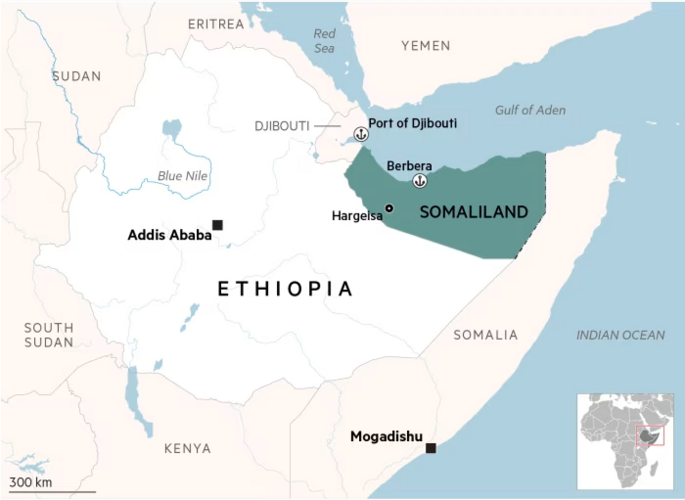- Joined
- 9 October 2009
- Messages
- 20,161
- Reaction score
- 10,803

The contentious deal that Somaliland has struck with Ethiopia to lease a strip of land near the entrance to the Red Sea would help “secure freedom of navigation” for international shipping that has faced attacks around the vital waterway, according to the breakaway country’s president.
Somaliland, which declared independence from Somalia in 1991 but has failed in its long-standing quest for global acceptance, signed the accord in January that swapped access territory on the Gulf of Aden in return for formal recognition from landlocked Ethiopia.
But Somalia has vehemently opposed the deal, with its president declaring that “not an inch” of its territory would be signed away by anyone.
Somaliland President Muse Bihi Abdi told the Financial Times that the Ethiopia accord would “allow Somaliland to support international efforts to secure freedom of navigation in the Gulf of Aden and the Red Sea”, where vessels have come under repeated assaults in recent months from Houthi rebels backed by Iran.
Ethiopia’s blueprint for the land around Berbera included a port and fleet that would help fend off maritime threats, he suggested. “Ethiopia will build a naval military base and have commercial ships and in exchange Ethiopia will give us recognition — that’s the basics,” said Bihi Abdi.
[snip]
(ft.com, registration or subscription may be required)Ethiopia has sought access to the coast ever since the 1993 split with Eritrea left it landlocked. It views the Somaliland deal as a way to alleviate its dependence on Djibouti for sea access, although the US, EU, Arab League and Egypt — which has a dispute with Ethiopia over a huge dam on the Blue Nile — have warned that the plan could escalate conflict in a region already battered by terrorism and war.
A senior Ethiopian official involved in the Somaliland talks said he was “optimistic” that an final agreement would materialise, adding: “It’s just a matter of realpolitik and necessity.” Omar Mahmood, senior analyst for Eastern Africa with Crisis Group, said that while the deal had created significant “blowback”, Ethiopia did not want to “completely give it up”.

Ethiopian Navy - Wikipedia
Last edited:
